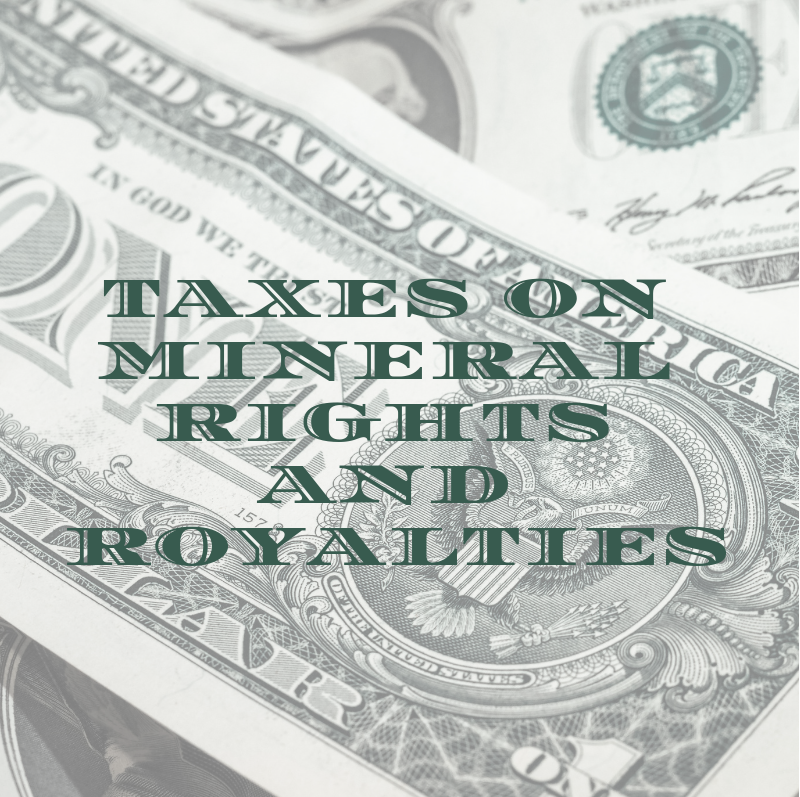Today we talk about how mineral rights and royalties are taxed. We cover the basics but as always, please consult with a CPA or attorney who is competent in oil & gas taxes and up-to-date on US tax codes.
Using the embedded player above, you can download the episode to your computer or listen to it here! Be sure to also subscribe on iTunesor wherever you get your podcasts and please leave us an honest rating and review. We read every one of them and sincerely appreciate any feedback you have. To ask us a question to be featured on an upcoming episode, please leave a comment below or send an email to feedback@mineralrightspodcast.com.
Click here for our FREE IRS Mineral Valuation and Tax Resource Guide.
Lease Bonus
- Lease bonus payments are treated as ordinary income. If you were paid more than $600 you will usually receive a 1099 for the lease bonus. Even if you don’t get a 1099, you are responsible for including this income on your tax return.
- Lease bonus payments are considered rental income for tax purposes. You may have to fill out a separate Schedule E for the lease bonus but you may be able to deduct any professional or legal costs incurred as a result of negotiating the lease. Check with your CPA!
Royalties
- Generally speaking, royalties are also treated as ordinary income and are taxed accordingly. Usually you will receive a 1099 from the operator (or crude/gas marketer). It is a good idea to make sure that the amounts are correct by cross-checking against your check stubs.
- Per the IRS:
- “Income from oil and gas royalties is passive-type income derived from the landowner’s royalty, overriding royalty, or a net profits interest. This type of income bears none of the burden of operations or development except taxes and any “post production” costs that state law allows an operator to charge a royalty owner in order to make the production marketable, such as for gas compression. Royalty income may be paid by the operator of the property or by the purchaser of the crude oil or gas production. In either event, the royalty owner should receive a statement with the check (usually monthly but at least periodically) showing the total sales of oil and gas from the property, interest in the property, and the amount of production. Taxpayer will normally report royalty income on Schedule E as rents and royalties or from flow through entities. The taxpayer can have both royalty and working interest income and report both on a Schedule C.”
Severance Tax
- While we are on the subject of royalties, you will see something called “severance tax” deducted from your monthly royalty checks.
- Severance tax is a special type of state tax that is paid on the production of oil & gas (and other non-renewable natural resources).
- According to the US Census Bureau, states collected over $9.8 billion in severance taxes in 2015! Many states rely on severance taxes to cover a significant portion of their state’s budget to fund things like education…
- Some states offer rebates or credits for certain types of wells (such as marginal producers, aka “stripper wells”) or under certain circumstances. Check with your state oil and gas commission for more information.
- Some states like Colorado, offer an ad valorem tax credit for property taxes paid and this is subtracted from your severance tax liability.
- Even if severance taxes are withheld from your royalty checks, you may have to fill out separate state tax returns – e.g. Colorado the Severance Tax Return is form DR0021.
- Matt has a blog post on severance taxes.
Depletion Deduction
What is it?
From the IRS:
- “An oil and/or gas producing property is a “wasting” asset. The quantity of oil and/or gas found in any natural deposit is finite. As the oil and/or gas is produced and removed from the deposit, the deposit is depleted. The owner of an economic interest in an oil and/or gas producing property may be entitled to a deduction from income for depletion of such economic interest as the oil and/or gas is produced and sold. Mineral interests, royalties, working interests, overriding royalties, net profits interests, and production payments are all economic interests in mineral deposits.
- Once a mineral property becomes productive, the owner or owners of economic interests in that property must recover their cost basis through the depletion deduction (or in the event of sale or other disposition prior to total depletion of the property as provided in the IRC for such sale or other disposition).”
Side note: With other capital investments, the asset is depreciated – the depletion deduction is like depreciation for oil and gas assets.
Since the deduction is only allowed once oil and gas is actually sold, it is not applicable against lease bonus payments.
In the case of oil and gas wells a “reasonable allowance” for depletion is an allowable deduction in computing taxable income.
The Internal Revenue Code provides two specific methods of computing the depletion deduction:
Cost Depletion
“The cost depletion method is essentially a “unit of production” method of computing the allowable current tax period deduction. This computation is based on the taxpayer’s basis as provided in IRC 612.”
It requires you to determine the property’s cost basis and determine the split between the value of the land and value of recoverable resources (e.g. oil & gas).
The Cost Depletion method requires you to know the total number of “recoverable units of mineral” in the property’s “natural deposit”. This is basically saying, you need to know the Estimated Ultimate Recovery of oil and gas associated with the property (aka reserves). It is rare for most landowners to allocate part of their cost basis to the oil and gas reserves so this is not usually used for mineral owners. Instead, there is another method called the “percentage depletion” deduction which is more commonly used.
Percentage Depletion
According to the IRS:
- “The percentage depletion deduction is a specified percentage of the taxpayer’s gross income from the property, but is limited to a maximum of 100 percent of the taxpayer’s net taxable income from the property. This is generally termed the “100 percent of net income limitation” . The 100 percent of net taxable income is computed without allowance for depletion in IRC 613(a). Refer to IRM 4.41.1.3.9.1.4 for a full discussion.”
- IRC 613A severely restricts the availability of percentage depletion for oil and gas production. In general, taxpayers classified as Independent Producers or Royalty Owners may claim percentage depletion on a limited volume of oil and gas production each year.
As you can tell the depletion deduction is a complex subject so it is important to get help from an accountant or other tax professional familiar with oil and gas laws and related IRS tax codes.
Inheritance and Sale of Mineral Rights
I have had several listeners come to me after they have sold their mineral rights and ask how to determine the cost basis for their minerals. I won’t say that it is “too late” but it becomes more difficult & costly to accurately determine the cost basis several years after you inherit the property.
Best case scenario if you inherit mineral rights is to consult with your CPA, attorney, or tax advisor to determine what you need to do to minimize your tax liability down the road should you decide to sell.
Sale of Mineral Rights
Generally if the property has been owned for more than a year, the sale will be taxed as “long-term capital gains”
Similar to owning stock, you would take the sales price minus the cost basis to determine your tax liability. Ffor example, if you sell a share of Apple for $175 and you purchased it for $75 more than a year ago, you would only pay taxes on the $100 in profit.
For a mineral rights sale, the capital gain would be determined based on the proceeds from the sale minus the basis assigned to the mineral rights when you purchased the land or inherited the minerals. If the value was “0”, then the entire sales proceeds would be taxed as capital gains income.
Click here for our FREE IRS Mineral Valuation and Tax Resource Guide.
1031 Exchange
If you do sell your mineral rights, you may be able to defer capital gains tax on the sale through what is called a 1031 exchange. The 1031 refers to the section of the IRS code that covers this but in general it covers using the proceeds from the sale of one property to purchase other similar property (other mineral rights or real estate). This is because an interest in mineral rights is an interest in a type of real property.
It is critical that you seek the advice of a competent tax and/or legal advisor if this is something you plan on doing as there are specific timeframes that the IRS outlines for performing a 1031 exchange.
Resources:
- IRS Oil & Gas Handbook
- IRS Like-Kind Exchanges – Real Estate Tax Tips
- Depletion Deduction – IRS Tax Code
- Blog Post on Severance Tax
Thanks for Listening!
To share your thoughts:
- Leave a comment or question below (we read each one and your question may be featured in a future episode)!
- Ask a question or leave us feedback via email or voicemail: (720) 580-2088.
To help out the show:
- Subscribe and leave a review on iTunes or wherever you get your podcasts – we read each one and greatly appreciate it. Plus, you can get a shout out on a future episode!
Thanks again – until next time!




